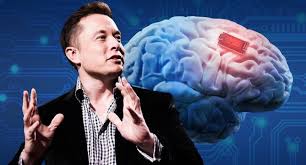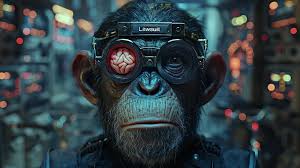Musk’s $50M Neuralink Brain Heist: Who’ll Hijack the Mind Game?
- NgocAnh
- March 29, 2025

Musk’s $50M Neuralink Brain Heist: Who’ll Hijack the Mind Game?
Introduction: Elon Musk, the renowned entrepreneur behind Tesla, SpaceX, and Neuralink, has been known for his bold and visionary ideas, but his latest venture takes things to a whole new level. Neuralink, Musk’s neurotechnology company, has been working on developing brain-machine interfaces (BMIs) that aim to revolutionize how humans interact with technology. However, in an unexpected twist, Musk has announced a $50 million prize to incentivize the development of technologies that can improve, disrupt, or hijack the mind-game Musk is playing. This announcement has sent shockwaves through the tech world, sparking curiosity, excitement, and speculation about the future of brain-computer interfaces. In this article, we dive into Musk’s latest challenge, the implications of Neuralink’s technology, and the potential for this $50 million prize to accelerate the development of next-generation neurotechnologies.
The $50 Million Neuralink Prize: A Game-Changing Challenge Musk’s decision to launch a $50 million prize for brain-machine interface technology has been met with both intrigue and skepticism. The challenge aims to drive competition and innovation in the rapidly evolving field of neurotechnology, encouraging teams from around the world to develop breakthroughs that could fundamentally change how we interact with machines, process information, and even communicate.
The prize focuses on creating or improving brain-machine interfaces that can achieve one of several key goals: enhancing human cognition, improving communication between humans and machines, enabling direct brain-to-brain communication, or revolutionizing the treatment of neurological diseases. The competition will also be looking for innovations that could improve the functionality, efficiency, and accessibility of BMIs, as well as ideas that explore the ethical and societal implications of these powerful technologies.
Musk has long been a proponent of the idea that brain-computer interfaces have the potential to not only revolutionize medicine but also redefine the human experience. With the $50 million prize, Musk is challenging innovators to tackle the technical, ethical, and social challenges of interfacing directly with the human brain. The competition will undoubtedly spark a flurry of new ideas, bringing together the brightest minds in neuroscience, engineering, and artificial intelligence.
Neuralink’s Vision: Transforming the Human Mind Neuralink, founded in 2016, has been Musk’s answer to the growing need for advanced brain-machine interfaces. The company’s ultimate goal is to create a seamless connection between the human brain and computers, enabling people to control devices, communicate, and even process information directly through their minds. The potential applications of Neuralink’s technology are vast, ranging from medical treatments for neurological disorders to enhancing human cognitive capabilities.
The most immediate use case for Neuralink’s brain-machine interface technology is in treating neurological diseases like Alzheimer’s, Parkinson’s, and spinal cord injuries. By implanting small, flexible electrodes into the brain, Neuralink aims to restore lost motor function and even reverse the effects of debilitating conditions. Musk has stated that this technology could eventually allow people to “upload” their thoughts, memories, and consciousness into machines, potentially unlocking the path to brain augmentation.
However, as Musk himself has acknowledged, the ethical and societal implications of this technology are profound. The idea of being able to directly interface with machines raises concerns about privacy, security, and the potential for abuse. Neuralink’s $50 million prize, which will encourage solutions to these challenges, highlights the need for a careful and thoughtful approach to the development of brain-machine interfaces.
The Mind Hijack: Who Will Control the Future of Brain Tech? The $50 million prize raises a key question: Who will ultimately control the power to influence or “hijack” the human mind? Musk’s vision for Neuralink involves enabling individuals to enhance their cognitive abilities and potentially protect themselves from the dangers of artificial intelligence. But the centralization of this power in the hands of a few companies or individuals raises concerns about its potential misuse.
The ethical considerations surrounding brain-machine interfaces are vast. How can we ensure that these technologies are used responsibly and for the benefit of society as a whole? What happens if this technology falls into the wrong hands? Musk himself has warned about the potential risks of AI and the need to create a symbiotic relationship between humans and machines. However, the ability to control or manipulate human cognition presents significant risks if not properly regulated.
As more players enter the race to develop brain-machine interface technologies, the stakes are higher than ever. The $50 million prize is Musk’s way of accelerating progress in this field, but it also opens the door to new questions about who will control the power to manipulate the human mind. Will we see a future where a handful of companies control access to neural enhancements, or will governments, healthcare providers, and ethical boards play a larger role in regulating the technology?
The Future of Human Enhancement: The Neuralink competition and the prize Musk has offered represent just one step in the larger trend toward human enhancement through technology. The idea of augmenting the human mind is no longer confined to the realm of science fiction. From neural implants to brain-controlled prosthetics, we are on the brink of a new era in which the boundaries between biology and technology blur.
While Musk’s focus on enhancing human cognition and treating neurological diseases is certainly ambitious, it raises questions about the future of human enhancement. If BMIs become widely available, will they become a tool for improving memory, learning, or intelligence? And if so, what are the potential risks of creating a society in which some individuals have enhanced cognitive abilities while others do not? The prize could help catalyze solutions to these questions by encouraging innovative approaches that consider both the potential benefits and the ethical implications of human enhancement.
The Global Race for Brain-Computer Interface Innovation: The launch of Musk’s $50 million prize marks the beginning of a global race for breakthroughs in brain-computer interface technology. Companies, research institutions, and independent innovators will now compete to develop the next generation of BMIs, pushing the boundaries of what is possible and potentially revolutionizing not just healthcare but the entire human experience.
As the competition heats up, we can expect to see rapid advancements in areas like neural mapping, signal processing, and AI integration. The prize could lead to unexpected innovations that improve the functionality and accessibility of BMIs, allowing people to control devices and communicate more easily. It could also spark new approaches to treating brain disorders, providing hope for patients with conditions that are currently difficult to treat.
However, as with any new technology, the development of brain-machine interfaces will require careful oversight and regulation. It’s essential that the competition encourages not only technical breakthroughs but also ethical considerations. Musk’s prize is an invitation for the world’s brightest minds to collaborate and address the most pressing challenges of the future—but it’s also a call for responsible development that ensures these powerful technologies benefit all of humanity.
Conclusion: Elon Musk’s $50 million Neuralink brain heist competition is a bold step toward advancing the future of brain-machine interfaces and exploring the potential of human enhancement. By offering such a substantial prize, Musk is accelerating innovation in an area that could transform how we live, communicate, and interact with technology. However, as with any groundbreaking technology, the ethical implications of brain-computer interfaces must be carefully considered to ensure that their power is used responsibly. As innovators from around the world compete for the prize, the future of the human mind may be shaped by these advancements, setting the stage for a new chapter in human evolution where technology and biology are intertwined.








